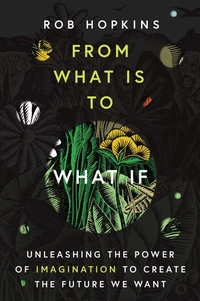The transition starts here, now and together. Interviews
Par : ,Formats :
Disponible dans votre compte client Decitre ou Furet du Nord dès validation de votre commande. Le format ePub est :
- Compatible avec une lecture sur My Vivlio (smartphone, tablette, ordinateur)
- Compatible avec une lecture sur liseuses Vivlio
- Pour les liseuses autres que Vivlio, vous devez utiliser le logiciel Adobe Digital Edition. Non compatible avec la lecture sur les liseuses Kindle, Remarkable et Sony
 , qui est-ce ?
, qui est-ce ?Notre partenaire de plateforme de lecture numérique où vous retrouverez l'ensemble de vos ebooks gratuitement
Pour en savoir plus sur nos ebooks, consultez notre aide en ligne ici
- Nombre de pages144
- FormatePub
- ISBN978-2-330-09285-6
- EAN9782330092856
- Date de parution04/10/2017
- Protection num.Digital Watermarking
- Taille4 Mo
- Infos supplémentairesepub
- ÉditeurÉditions Actes Sud
- TraducteurLisa Davidson
Résumé
One day in 2005, Rob Hopkins, an ordinary British citizen, started knocking on his neighbors' doors in the small town of Totnes, where he had just settled. He was proposing that they come together to organize nothing less than a new, locally based economy. A new model, the Transition Town, harnessing resources at hand: no longer expect food to arrive from the other side of the planet at great fuel costs, but instead create short food supply chains and cultivate all the available land (gardens, rooftops, municipal parks); no longer complain about pollution, but federate fellow citizens around a project of local renewable energy cooperatives; no longer rail against the banks and the stock markets, but adopt a local currency that enriches the community.
His experience has not only been successful in Totnes; it has spread to 1, 200 cities in 47 countries. Each of the Transition Towns are transforming their communities, without fanfare, without outside funding, making them more autonomous and more resilient to the crises looming ahead-a network of oases offering a wealth of solutions.
His experience has not only been successful in Totnes; it has spread to 1, 200 cities in 47 countries. Each of the Transition Towns are transforming their communities, without fanfare, without outside funding, making them more autonomous and more resilient to the crises looming ahead-a network of oases offering a wealth of solutions.
One day in 2005, Rob Hopkins, an ordinary British citizen, started knocking on his neighbors' doors in the small town of Totnes, where he had just settled. He was proposing that they come together to organize nothing less than a new, locally based economy. A new model, the Transition Town, harnessing resources at hand: no longer expect food to arrive from the other side of the planet at great fuel costs, but instead create short food supply chains and cultivate all the available land (gardens, rooftops, municipal parks); no longer complain about pollution, but federate fellow citizens around a project of local renewable energy cooperatives; no longer rail against the banks and the stock markets, but adopt a local currency that enriches the community.
His experience has not only been successful in Totnes; it has spread to 1, 200 cities in 47 countries. Each of the Transition Towns are transforming their communities, without fanfare, without outside funding, making them more autonomous and more resilient to the crises looming ahead-a network of oases offering a wealth of solutions.
His experience has not only been successful in Totnes; it has spread to 1, 200 cities in 47 countries. Each of the Transition Towns are transforming their communities, without fanfare, without outside funding, making them more autonomous and more resilient to the crises looming ahead-a network of oases offering a wealth of solutions.

















